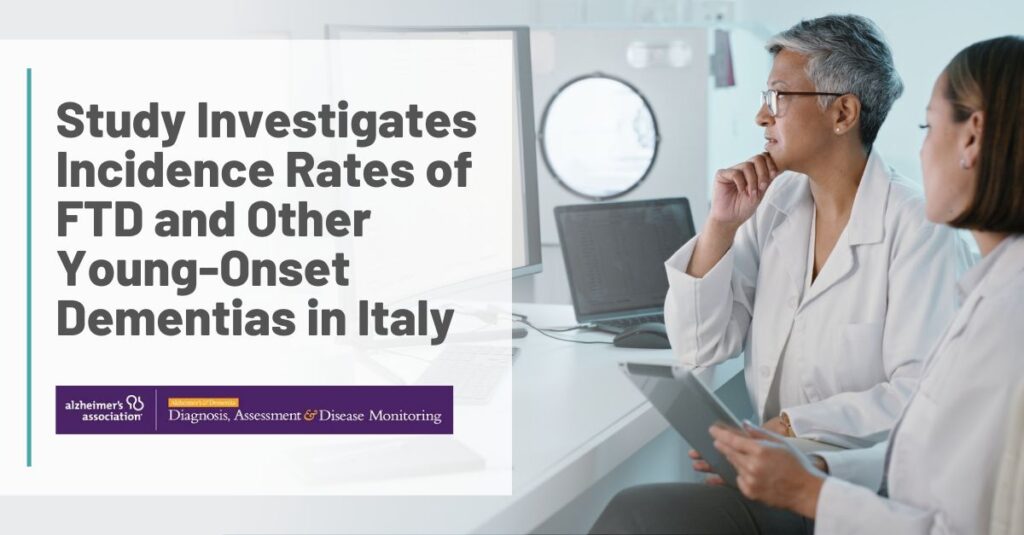Badanie bada wskaźniki zapadalności na FTD i inne demencje o wczesnym początku we Włoszech

Badanie opublikowane w czasopiśmie Diagnoza, ocena i monitorowanie chorób bada częstość występowania neurodegeneracyjnych demencji o wczesnym początku (YOD), takich jak FTD, w prowincji Brescia we Włoszech.
Jak podkreślili autorzy badania, większość usług dla osób dotkniętych demencją jest dostosowana do potrzeb osób starszych i często nie jest dostosowana do potrzeb młodszych dorosłych dotkniętych zaburzeniami takimi jak FTD. YOD często występują, gdy ludzie zakładają rodziny i rozwijają swoje kariery, i mogą włożyć znaczne obciążenie finansowe na osoby dotknięte chorobą. Autorzy badania podkreślili potrzebę zaktualizowanych danych na temat wskaźników zapadalności na YOD, wskazując na niezaspokojone potrzeby rodzin i ewolucję kryteriów klinicznych stosowanych do diagnozowania FTD i innych zaburzeń.
Aby ocenić wskaźnik zapadalności w całej populacji Włoch, autorzy zwrócili się do danych rejestrowych zebranych w Brescii. W prowincji działa 11 ośrodków dla osób z zaburzeniami poznawczymi i demencją (CCDD), które zapewniają bezpłatną opiekę osobom zdiagnozowanym przez włoski Narodowy System Zdrowia. Podobnie jak ośrodki dla osób z demencją w USA, CCDD współpracują z badaczami, dostarczając im danych.
Autorzy zebrali dane tylko od osób, które odwiedziły CCDD w 2019 r. i otrzymały diagnozę FTD, choroby Alzheimera o wczesnym początku lub otępienia z ciałami Lewy'ego o wczesnym początku (DLB). Naukowcy zbadali również wskaźniki zapadalności znane podtypy FTD, rejestrując niepewne diagnozy w kategorii „nieokreślone FTD”. Osoby biorące udział w badaniu zostały najpierw skierowane do CCDD przez lekarza na podstawie objawów, zanim przeszły badania przesiewowe w kierunku demencji przeprowadzane przez neurologów. Osoby, których objawy i cechy choroby spełniały kryteria diagnostyczne FTD, choroby Alzheimera lub DLB, zostały wzięte pod uwagę w badaniu.
Naukowcy odnotowali szczegółową historię kliniczną każdego uczestnika, korzystając ze starannie ustrukturyzowanego kwestionariusza, ze szczególnym uwzględnieniem wieku wystąpienia choroby i czasu od wystąpienia do diagnozy. W niektórych przypadkach naukowcy pomagali w potwierdzeniu diagnozy za pomocą skanów PET i badania próbek płynu mózgowo-rdzeniowego pod kątem biomarkerów.
W ciągu 2019 r. u 29 osób w Brescii zdiagnozowano wczesną demencję, a u 15 osób rozpoznano FTD. U dwunastu zdiagnozowano wczesną chorobę Alzheimera, a u pozostałych dwóch DLB. Wśród osób z FTD autorzy udokumentowali diagnozę z każdego znanego podtypu FTD poza FTD-ALS:
- Pięć osób ze zdiagnozowaną behawioralną odmianą FTD
- U dwóch osób zdiagnozowano niepłynną/agramatyczną odmianę afazji pierwotnej postępującej
- U dwóch osób zdiagnozowano wariant semantyczny afazji pierwotnej postępującej
- Trzy osoby ze zdiagnozowanym zespołem korowo-podstawnym
- U jednej osoby zdiagnozowano postępujące porażenie nadjądrowe
W trakcie rocznego badania naukowcy odkryli, że wskaźnik zapadalności na demencję o wczesnym początku w Brescii wynosi 4,55 przypadków na 100 000 osób. Według autorów, w 2019 r. skutkowałoby to w całej populacji Włoch, ze wskaźnikiem zapadalności 5,04% na 100 000 osób. Wskaźnik zapadalności na FTD wynosił 2,37 przypadków na 100 000 osób, przy czym choroba Alzheimera o wczesnym początku wynosiła 1,90 przypadków, a DLB 0,31 przypadków. Średni wiek diagnozy wynosił 62 lata, a mediana czasu między pojawieniem się objawów a diagnozą wynosiła dwa lata.
Autorzy zauważają, że ich odkrycia są sprzeczne z wcześniejszymi badaniami, które twierdziły, że choroba Alzheimera jest najczęstszą przyczyną demencji w młodym wieku. Naukowcy teoretyzują, że to odkrycie może być przynajmniej częściowo wyjaśnione przez rosnącą świadomość FTD.
Istnieje wiele możliwości udziału w badaniach naukowych, które prowadzą naukę FTD w kierunku wyleczenia. Dowiedz się więcej o swoich opcjach, odwiedzając nasz Sposoby uczestnictwa strona.
Zasoby dla rodzin zmagających się z FTD są coraz liczniejsze na całym świecie – strona internetowa AFTD może pomóc Ci je znaleźć międzynarodowe opcje wsparcia FTD w Twojej okolicy. Jeśli masz pytania dotyczące zasobów międzynarodowych, skontaktuj się z nami Infolinia AFTD Na: 1-866-507-7222 Lub info@theaftd.org.
Według kategorii
Nasze biuletyny
Bądź na bieżąco
Zarejestruj się już teraz i bądź na bieżąco dzięki naszemu biuletynowi, powiadomieniom o wydarzeniach i nie tylko…
